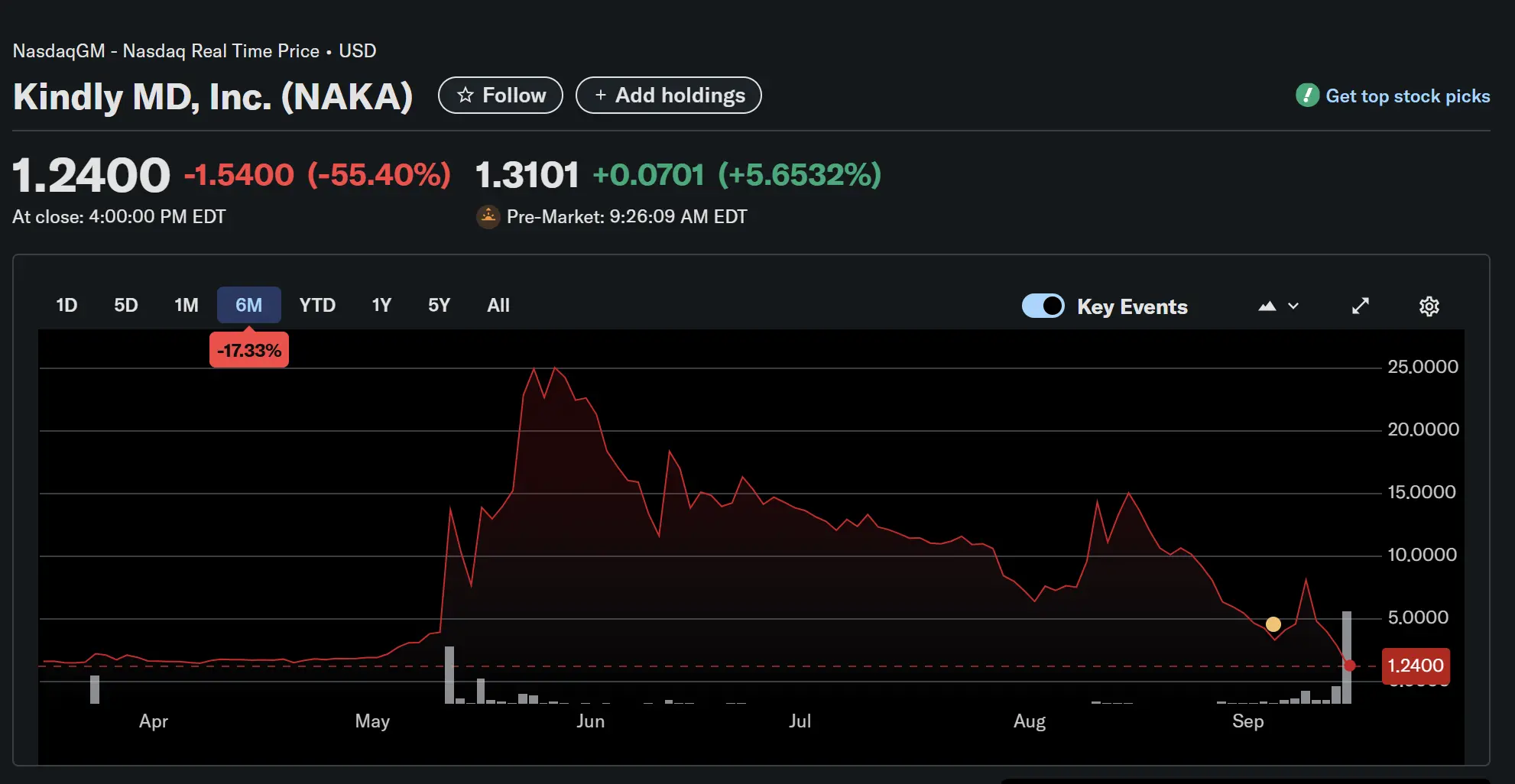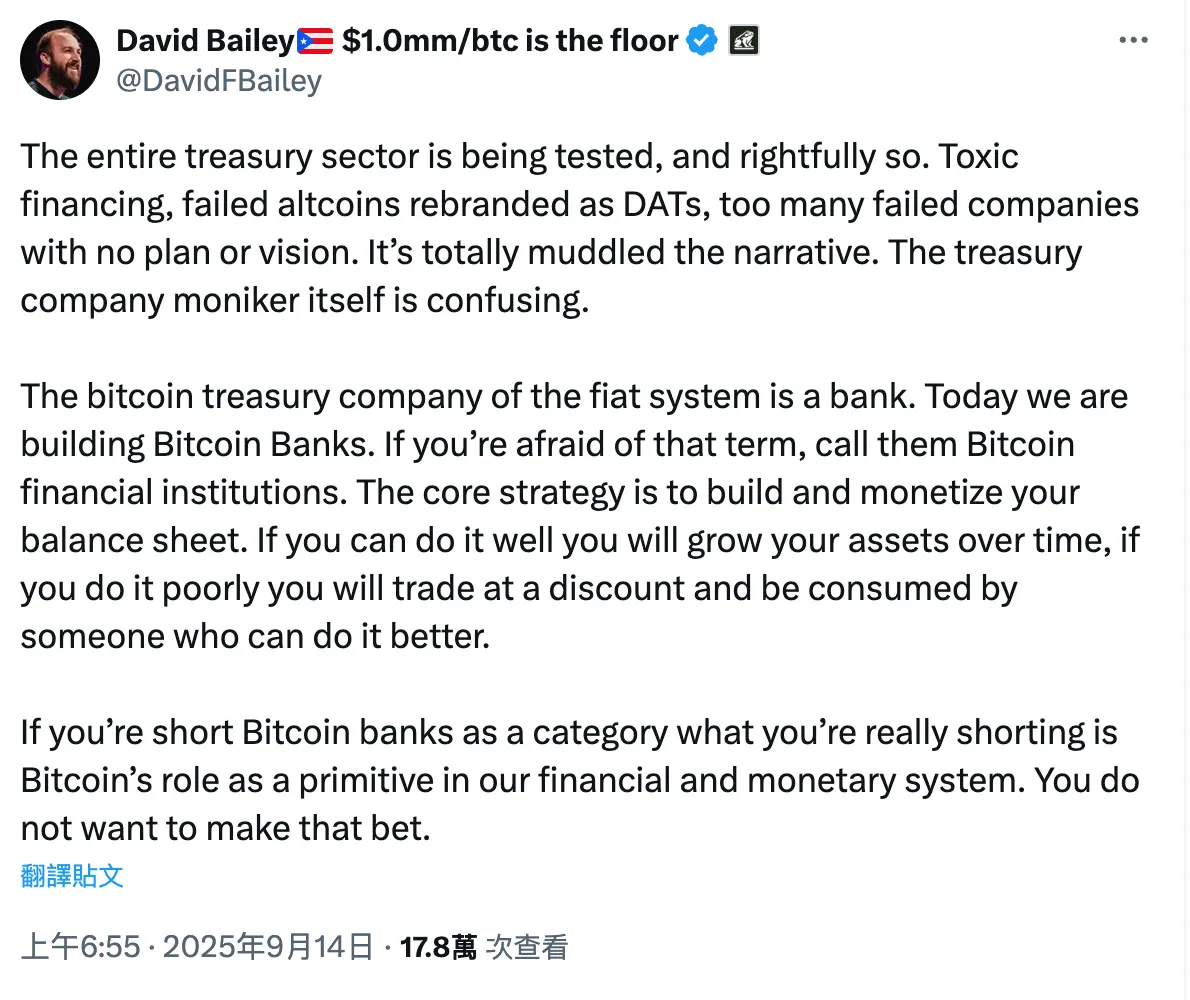Author: Chloe, ChainCatcher
On September 15, the stock price of KindlyMD (NAKA) fell to $1.28, dropping 54% within 24 hours before the deadline, and over 90% in a month. This company, which transitioned from healthcare to Bitcoin (BTC) assets, is now facing dual pressures from its equity dilution plan and general investor fatigue towards the Digital Asset Trust (DAT) strategy.
KindlyMD was originally listed on NASDAQ as an integrated healthcare technology company, and its transformation began with the merger with Bitcoin (BTC) asset Nakamoto Holdings. Founder David Bailey previously served as a cryptocurrency policy advisor to former U.S. President Trump and is well-versed in industry regulatory dynamics.
A month ago, KindlyMD announced a plan to raise $540 million through a stock issuance to expand its Bitcoin reserves. In mid-August, KindlyMD announced its first purchase of Bitcoin, acquiring approximately 5,744 Bitcoins through a subsidiary of Nakamoto for a total price of about $679 million, averaging around $118,200 per Bitcoin, when the Bitcoin price was around $110,000.
The stock peaked above $15 in mid-August, then began to plummet sharply, accelerating its decline throughout September.

Company Announces PIPE Financing, Stock Price Halves
"As these shares enter the market, the company expects stock price volatility may intensify in the short term. For shareholders seeking short-term trades, the company recommends exiting," David Bailey stated on social media on September 12, indicating that the company had submitted an S3 form to register the shares sold in the PIPE financing.
PIPE financing is a method of raising funds by selling shares to private investors, typically at a discount to the market price. Once the S3 registration is completed, these shares can enter public market trading. The introduction of a large number of new shares (in this case, shares from PIPE financing) increases the supply of stock in the market, which, if not matched by a corresponding increase in demand, may put downward pressure on the stock price, leading to volatility.
KindlyMD's move directly allows for the gradual issuance of shares at the current market price, raising significant concerns among investors about equity dilution.
Related to Saturation Signals in Digital Asset Trust (DAT)?
A report released by Grayscale in August recorded a decline in investor enthusiasm for Digital Asset Trust (DAT), noting that Bitcoin exchange-traded products experienced their first monthly net outflow since March, with redemptions totaling $755 million. The report measures supply-demand imbalance by comparing the market capitalization to the underlying crypto asset value using the "mNAV" ratio.
According to Grayscale, the mNAV ratio of major DAT companies has approached 1.0, indicating that supply and demand have reached equilibrium, rather than the premium valuations these products previously enjoyed. The results show that investors are no longer willing to pay a premium for exposure to cryptocurrencies through public stock instruments.
In a report released in August 2025, Grayscale disclosed that investor enthusiasm for Digital Asset Trust (DAT) has waned, primarily due to Bitcoin exchange-traded products (ETPs) experiencing their first monthly net outflow since March, with redemptions totaling $755 million. This reflects that investors are reducing their holdings and enthusiasm for Bitcoin spot ETPs. Meanwhile, ETH-related spot ETPs have attracted significant inflows, with a net inflow of approximately $3.9 billion in August, marking two consecutive months of net inflows, indicating a preference for diversified asset allocation, particularly with enhanced confidence in Ethereum and its application areas (such as DeFi and smart contracts).
The "mNAV" mentioned in the report measures the supply-demand balance between the stock price of DAT companies and the market value of their held crypto assets. The mNAV (market NAV) ratio compares the company's market capitalization to the market value of its underlying crypto assets. When the ratio approaches 1.0, it indicates that the market price aligns with the actual value of the held assets, reflecting a balance in supply and demand. Grayscale pointed out that the mNAV ratios of most major DAT companies have approached 1.0, indicating that the market is no longer willing to provide premium valuations for these companies, meaning investors are no longer paying extra to gain cryptocurrency exposure through stock avenues.
Thus, the decline in investor enthusiasm, outflows from Bitcoin ETPs, and the disappearance of valuation premiums for DAT companies reflect a saturation and rational return of demand for such digital asset investment tools across the market.
Despite the fatigue shown towards Bitcoin DAT, altcoin DATs continue to emerge.
Are Altcoin DATs Confusing?
Regarding altcoin DATs, recent announcements from tokens like Solana and Cronos have revealed the establishment of new digital asset trusts, indicating that while investor enthusiasm for overall DAT companies is declining, institutions continue to launch related products.
According to reports in August, NASDAQ-listed Mill City Ventures III may raise another $500 million to fund its recently announced Sui token DAT strategy. Galaxy Digital noted on July 31 that narrative-driven investments are prompting the company to expand its trust, not limited to Bitcoin.
Cryptocurrencies such as ETH, Solana, XRP, BNB, and HyperLiquid are gradually gaining favor in corporate trusts outside of Bitcoin.
According to data from BitcoinTreasuries.NET, publicly listed companies hold Bitcoin worth approximately $117.91 billion. Ethereum, as another crypto asset, is increasingly valued, partly because it can be staked to generate annual returns, serving both as a store of value and a source of income.
Data from StrategicETHReserve indicates that approximately 3.14% of the total supply of Ethereum is held by listed DAT companies. Galaxy Digital CEO Mike Novogratz stated that the interest of DAT companies in the broader crypto market may be a reason for Bitcoin's recent price consolidation. "Bitcoin is currently in a consolidation phase, partly because most DAT companies are starting to experiment with other tokens."
However, David Bailey criticized the term "digital asset trust" itself as confusing, noting that more companies are holding assets beyond Bitcoin on their balance sheets. "Many companies are including underperforming altcoins on their balance sheets, which muddles the DAT narrative."

Image source: X @DavidFBailey
Currently, altcoins are heavily allocated in many companies' financial reports, leading to market doubts about certain digital asset companies (including some DAT or similar financial entities). Altcoins are under scrutiny in trusts, and Bitcoin trusts are now facing questions as well.
Venture capital firm Breed stated that only a few Bitcoin trust companies can withstand the test of time and avoid falling into a "death spiral" of trading close to net asset value.
免责声明:本文章仅代表作者个人观点,不代表本平台的立场和观点。本文章仅供信息分享,不构成对任何人的任何投资建议。用户与作者之间的任何争议,与本平台无关。如网页中刊载的文章或图片涉及侵权,请提供相关的权利证明和身份证明发送邮件到support@aicoin.com,本平台相关工作人员将会进行核查。




